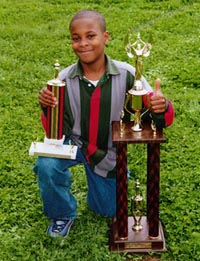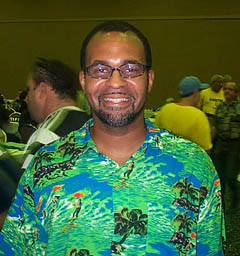 |
 |
 |
 |
 |
 |
 |
 |
 |
 |
 |
 |
 |
 |
 |
 |
 |
 |
 |
 |
 |
 |
 |
 |
 |
 |
|
|
|
|
|
|
|
|
|
|
|
|
|
|
|
|
|
|
|
|
|
|
|
|
|
|
|
 |
|
|
|
|
|
|
|
|
DC Chess making an Impact!
|
|
|
|
|
|
|
|
|
|

|
|

|
|

|
|

|
|
|
|
|
|
|
|
|
|
|
|
|
|
Kaleem Washington of Northeast is making the right moves. As a member of Olympic Chess House in Northeast, he practices the popular game Tuesday and Thursday evenings. He also studies chess tactics at least three hours a week.
The intense mental activity not only helps him beat his opponents, but it also sharpens his skills at school, says the seventh-grader at St. Albans School, the National Cathedral School for Boys, in Northwest. In 2001, he won the Virginia Elementary School Championship and the Maryland Elementary School Championship.
"Chess is a game of the mind," the 13-year-old says. "It's a thinking game. It helps me be focused and calm and see situations all the way through."
|
|
|
|
|
|
|
|

|
|
|
|
|
|
|
|
|
Learning chess can be a fun pastime, but many educational professionals believe the activity can also improve a person's critical-thinking abilities, math skills and language expertise. The competition also can teach life lessons.
Willette Seaward of Northeast, Kaleem's mother, says she has seen positive changes in her son since he started playing chess. He has competed in more than 55 tournaments since age 8.
"My son needed to focus in class," Ms. Seaward says. "I found he didn't have the discipline he needed. Students who participate in chess increase their abilities in reading, math and science. … He wouldn't be in one of the best schools now if those things weren't in place."
|
|
|
|
|
|
|
|
|
|
|
|
|
|
Kaleem is one of the many students in the Olympic Chess House who compete on a national level for a partial or full scholarship to college, says Vaughn Bennett, executive director of the nonprofit organization.
The house is affiliated with the U.S. Chess Federation (www.uschess.org) in New Windsor, NY, which holds competitions that award college scholarships. Students can earn the scholarships even when in elementary school.
The next big event, Supernationals III, will be held in April in Nashville, Tenn. The 2001 Supernationals II in Kansas City, Mo., awarded six full scholarships to the University of Texas at Dallas, Mr. Bennett says.
"As far as getting a scholarship, this is something just as important as baseball or football, but this helps the social skills," he says. "It's like the other sports, but you can compete for a full scholarship at any grade."
|
|
|
|
|
|
|

|
|
|
|
|
|
|
|
|
|
|
Vaughn Bennett
Olympic Chess House
(photo by Daaim Shabazz)
|
|
|
|
|
|
|
|
|
|
|
|
|
 |
|
|
|
|
"The game also teaches life skills,
such as delaying gratification."
~ David Mehler ~
|
|
|
|
|
 |
|
|
|
|
|
|
|
|
|
When beginners approach the game, they should start by learning the importance of pawns, says David Mehler, executive director of the U.S. Chess Center in Northwest (www.chessctr.org). Although pawns may have less value than a queen, the pieces should be intelligently used for the player's advantage. The center is holding summer camps for interested people.
"We teach them that controlling the center of the board is important," Mr. Mehler says. "Pieces should be used and not left on their starting squares. And it's important to protect the king."
Chess etiquette, such as remaining silent during game play, is important, Mr. Mehler says. At the beginning and end of each game, players should shake hands. Then, they concentrate on their game without distracting their opponent.
They are required to record all their moves in a log. Further, they use the "touch-move rule," which dictates that the first piece touched is the one that must be moved.
The game also teaches life skills, such as delaying gratification, Mr. Mehler says. The game can illustrate how it is important to think before making a move and how a good position can deteriorate if it's not continually improved.
"When they start each game, they have the exact same position and material as their opponent," he says. "How the game turns out depends on what they do with their turns. They learn to focus and concentrate for extended periods of time. They learn to evaluate situations, to distinguish between good and bad ideas."
|
|
|
|
|
|
|
|
|
 |
|
|
|
|
"Problem-solving comes up in chess, just like it comes up in life. If you're playing your side of the board, you are responsible for your moves. You can't blame anybody.
~ Eugene Brown, Big Chair Chess Club ~
|
|
|
|
|
 |
|
|
|
|
|
|
|
|
|
Eugene Brown, founder of the Big Chair Chess Club in Northeast, says he hopes the time his members spend playing chess will help them in other areas of their lives. He has seen involvement in chess improve the lives of at-risk youths because the game shows them the importance of thinking before acting.
"What is the only legal way to sell drugs?" he asks a group of boys from the chess club. "To go to college and become a pharmacist."
Mr. Brown says he wishes public schools in the District would incorporate a mandatory curriculum involving chess for all students. Once the children can learn to sit still, he believes, they can learn anything. However, he says it is important to quiet the mind.
"Problem-solving comes up in chess, just like it comes up in life," Mr. Brown says. "If you're playing your side of the board, you are responsible for your moves. You can't blame anybody. We try to cut excuses. When you touch the piece, you should already know where you're going."
John Queen, 11, of Southeast, has been playing chess for about three years. He is a member of the Big Chair Chess Club and is in the fifth grade at Mary Church Terrell Elementary School in Southeast.
"It's fun, and it helps me learn how to concentrate," he says. "If you lose or win, it doesn't really matter. You still learn."
|
|
|
|
|
|
|
|
|
|

|
|

|
|

|
|

|
|
|
|
|
|
|
|
|
Chess often is taught along with the game of tennis, says William Young, director of education at Washington Tennis and Education Foundation in Northwest. From 10 a.m. to 2 p.m. Saturday, the nonprofit organization is sponsoring a chess tournament for interested children.
There are many similarities between tennis and chess, he says. Both are played on a "board" and have defined parameters. Both require mental skills. A player sets up his opponent in tennis and in chess.
"What you think is the best tactic, if you really stop and wait a minute and think about it, there may be a better strategy," he says. "What you think is reality, it may not be. It may be the tactic that the other person is using to defeat you. ... Chess can help people become the winners that they were born to be."
|
|
|
|
|
|
|
|
|
|
|
|
|
|
 |
|
|
|
|
 |
|

